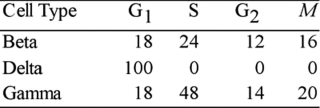Multiple Choice
Please use the following information to answer the question(s) below.
The data in Table 9.1 were obtained from a study of the length of time spent in each phase of the cell cycle by cells of three eukaryotic organisms designated beta, delta, and gamma.  Table 9.1
Table 9.1
Minutes Spent in Cell Cycle Phases
-Several organisms, including a number of protists, have intermediate mitotic organization. Which of the following is the most probable hypothesis regarding these intermediate forms of cell division?
A) They represent a form of cell reproduction that must have evolved completely separately from those of other organisms.
B) They demonstrate that these species are not closely related to any of the other protists and may well be a different kingdom.
C) They rely on totally different proteins for the processes they undergo.
D) They may be more closely related to plant forms that also have unusual mitosis.
E) They show some but not all of the evolutionary steps toward complete mitosis.
Correct Answer:

Verified
Correct Answer:
Verified
Q10: Use the following information to answer the
Q16: Which of the following does not occur
Q16: Please use the following information to answer
Q16: What is a cleavage furrow?<br>A)a ring of
Q17: A particular cell has half as much
Q19: Compared to most prokaryotic cells, eukaryotic cells
Q23: Which of the following are primarily responsible
Q25: Density-dependent inhibition is explained by which of
Q45: If there are 20 centromeres in a
Q56: The cell cycle is regulated at the